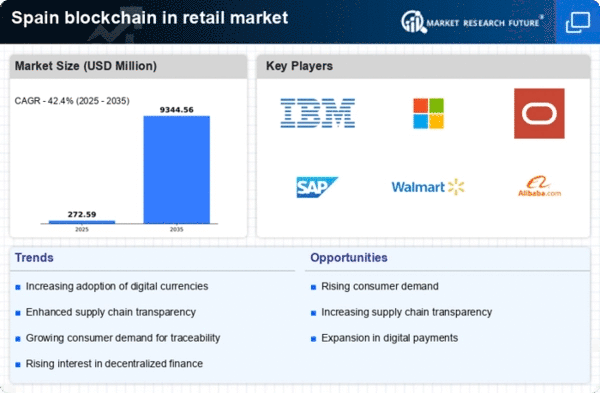Enhanced Customer Experience
The blockchain in-retail market in Spain is increasingly driven by the demand for enhanced customer experiences. Retailers are leveraging blockchain technology to create personalized shopping experiences and loyalty programs. By utilizing customer data securely stored on the blockchain, retailers can offer tailored promotions and rewards, fostering customer loyalty. Recent studies indicate that 65% of consumers in Spain are more likely to engage with brands that provide personalized experiences. This shift towards customer-centric strategies suggests that the blockchain in-retail market will continue to evolve as retailers seek innovative ways to engage consumers and differentiate themselves in a competitive landscape.
Collaboration and Partnerships
The blockchain in-retail market in Spain is witnessing a surge in collaboration and partnerships among various stakeholders. Retailers, suppliers, and technology providers are increasingly joining forces to develop and implement blockchain solutions that enhance supply chain efficiency and transparency. This collaborative approach allows for the sharing of resources and expertise, which can accelerate the adoption of blockchain technology. In Spain, approximately 55% of retailers report that partnerships are essential for their blockchain initiatives. This trend indicates a shift towards a more interconnected retail ecosystem, where collaboration is key to unlocking the full potential of blockchain in the retail sector.
Cost Reduction through Efficiency
the blockchain in retail market in Spain is poised for growth. as retailers recognize the potential for cost reduction through enhanced operational efficiency. By utilizing blockchain technology, retailers can streamline processes such as inventory management and payment systems. For instance, the implementation of blockchain can reduce transaction costs by up to 30%, as it minimizes the need for intermediaries. Furthermore, the automation of supply chain processes can lead to significant savings in labor costs. As Spanish retailers increasingly adopt these technologies, they are likely to experience improved profit margins and operational agility. This trend suggests that the blockchain in-retail market will continue to attract investment as businesses seek to optimize their operations and reduce overhead costs.
Increased Demand for Traceability
the blockchain in retail market in Spain experiences heightened demand for traceability solutions. Consumers increasingly seek transparency regarding the origins of products, particularly in food and luxury sectors. This trend is driven by a growing awareness of sustainability and ethical sourcing. According to recent data, approximately 70% of Spanish consumers express a preference for brands that provide clear information about product sourcing. Retailers are thus compelled to adopt blockchain technology to enhance traceability, ensuring that every step of the supply chain is recorded and verifiable. This not only builds consumer trust but also helps retailers comply with regulatory requirements. As a result, the blockchain in-retail market is likely to expand as businesses invest in these technologies to meet consumer expectations and regulatory standards.
Regulatory Compliance and Security
The blockchain in-retail market in Spain is significantly influenced by the need for regulatory compliance and enhanced security measures. With increasing scrutiny from regulatory bodies, retailers are compelled to adopt technologies that ensure compliance with data protection laws and consumer rights. Blockchain offers a secure and immutable ledger, which can help retailers maintain accurate records and demonstrate compliance. In Spain, approximately 60% of retailers indicate that regulatory compliance is a primary driver for adopting blockchain solutions. This focus on security not only protects consumer data but also enhances brand reputation. Consequently, the blockchain in-retail market is likely to see sustained growth as businesses prioritize compliance and security in their operations.
















